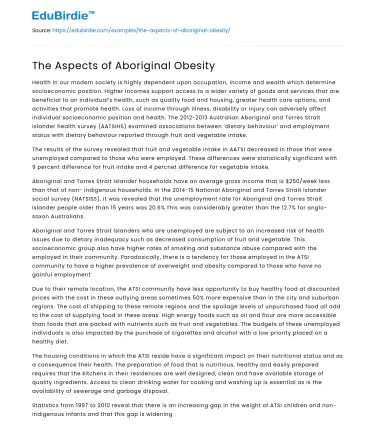Health in our modern society is highly dependent upon occupation, income and wealth which determine socioeconomic position. Higher incomes support access to a wider variety of goods and services that are beneficial to an individual’s health, such as quality food and housing, greater health care options, and activities that promote health. Loss of income through illness, disability or injury can adversely affect individual socioeconomic position and health. The 2012-2013 Australian Aboriginal and Torres Strait Islander health survey (AATSIHS) examined associations between ‘dietary behaviour’ and employment status with dietary behaviour reported through fruit and vegetable intake.
The results of the survey revealed that fruit and vegetable intake in AATSI decreased in those that were unemployed compared to those who were employed. These differences were statistically significant with 9 percent difference for fruit intake and 4 percnet difference for vegetable intake.
Save your time!
We can take care of your essay
- Proper editing and formatting
- Free revision, title page, and bibliography
- Flexible prices and money-back guarantee
Aboriginal and Torres Strait Islander households have an average gross income that is $250/week less than that of non- Indigenous households. In the 2014-15 National Aboriginal and Torres Strait Islander social survey (NATSISS), it was revealed that the unemployment rate for Aboriginal and Torres Strait Islander people older than 15 years was 20.6%.This was considerably greater than the 12.7% for anglo-saxon Australians.
Aboriginal and Torres Strait Islanders who are unemployed are subject to an increased risk of health issues due to dietary inadequacy such as decreased consumption of fruit and vegetable. This socioeconomic group also have higher rates of smoking and substance abuse compared with the employed in their community. Paradoxically, there is a tendency for those employed in the ATSI community to have a higher prevalence of overweight and obesity compared to those who have no gainful employment
Due to their remote location, the ATSI community have less opportunity to buy healthy food at discounted prices with the cost in these outlying areas sometimes 50% more expensive than in the city and suburban regions. The cost of shipping to these remote regions and the spoilage levels of unpurchased food all add to the cost of supplying food in these areas. High energy foods such as oil and flour are more accessible than foods that are packed with nutrients such as fruit and vegetables. The budgets of these unemployed individuals is also impacted by the purchase of cigarettes and alcohol with a low priority placed on a healthy diet.
The housing conditions in which the ATSI reside have a significant impact on their nutritional status and as a consequence their health. The preparation of food that is nutritious, healthy and easily prepared requires that the kitchens in their residences are well designed, clean and have available storage of quality ingredients. Access to clean drinking water for cooking and washing up is essential as is the availability of sewerage and garbage disposal.
Statistics from 1997 to 2010 reveal that there is an increasing gap in the weight of ATSI children and non-indigenous infants and that this gap is widening. This gap is a result of both under nutrition and over nutrition in utero and in the early years of life. Studies have shown that one third of ATSI infants at two years of age were overweight or obese. They have also revealed that this figure has increased by over 20% in Aboriginal children in the past 13 years. The waist measurement to height ratio is a measure of lifetime risk of chronic diseases such as stroke, cardiovascular disease and diabetes. This figure has increased by one third in this population in this time frame.
Body Mass index has also been reported as a measure of health and fitness and data on ATSI children was collected in 2012-2013. The study showed that 30% of ATSI children aged 2-14 were considered overweight or obese on the BMI scale, 62% lay in the normal range and 8% were underweight.
A 2012 study found a consistent link in ATSI children between obesity and overweight issues and decreased levels of physical activity. It found that the female children in this population had higher levels of abdominal obesity than their male counterparts. The identified possible reasons for this increase in weight is a lack of daily breakfast, excessive time on computers , tablets and phones and the excessive consumption of sugary drinkls such as soft drink and energy drinks






 Stuck on your essay?
Stuck on your essay?

